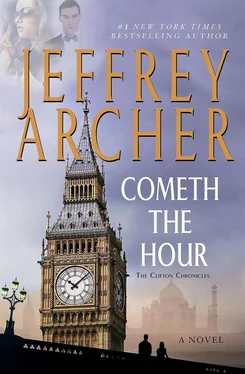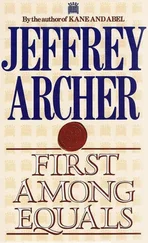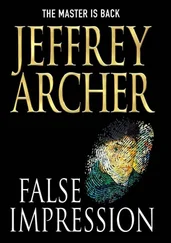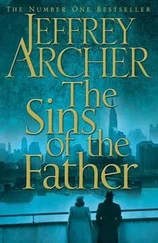Virginia pressed the bell, took out her handkerchief, and was pleased to see the same assistant step forward to open the door. She bowed her head and dabbed away an imaginary tear.
“Is everything all right, madam?” he asked solicitously.
“No, I’m afraid it isn’t,” she said, her voice quivering. “My beloved has changed his mind and asked me to return this,” she said, removing the engagement ring from her finger.
“I’m so sorry, my lady.”
“Not as sorry as I am,” she said placing the ring on the counter. “He asked me if you could return his check.”
“That won’t be possible, madam, we banked it immediately, and as you had taken the ring with you, we requested same-day clearance.”
“Then I’ll need a check for the full amount in compensation. After all, you witnessed him giving me the ring, and I’ve agreed with his lawyers not to pursue the matter any further. Always so unpleasant when the press become involved, don’t you think?” The assistant looked anxious. “None of us need that sort of publicity, do we? And of course, it’s possible my beloved might change his mind again, in which case I’ll be back. So perhaps you could put the ring on one side for a few days.”
The assistant hesitated before saying, “Who shall I make the check out to, my lady?”
“The Lady Virginia Fenwick,” she said, giving him a warm smile.
The assistant disappeared into the back office and didn’t reappear for what seemed to Virginia like an eternity. He finally returned and handed her a check for £14,000. As Virginia placed the check in her handbag, he came around from behind the counter, opened the front door and said, “Good day, my lady. I hope we’ll be seeing you again soon.”
“Let’s hope so,” said Virginia as she walked out onto the pavement. She hailed a taxi and instructed the cabbie to take her to Coutts in the Strand. Once again she prepared her words carefully for whatever his name was.
On arrival at the bank, she told the driver to wait as she would only be a few minutes. She got out, walked into Coutts and headed straight for the manager’s office. She marched in to find him dictating a letter to his secretary.
“You can leave us, Mrs. Powell,” said Mr Fairbrother. He was about to tell her ladyship that he wasn’t willing to see her again unless she made an appointment, when Virginia placed the check on the desk in front of him. He stared at the figure of £14,000 in disbelief.
“Be sure to clear every one of my outstanding checks without delay,” she said. “And please don’t bother me again in the future.” Before he could respond, Virginia had left the office and closed the door behind her.
“The Ritz,” she told the waiting cabbie. The taxi swung around onto the other side of the road and headed for Piccadilly. They came to a halt outside the hotel ten minutes later. Virginia handed over her last pound, walked up the steps and made her way to the reception desk.
“Good morning, madam, how may I help you?”
“Would you please call Mr. Cyrus T. Grant in the Nelson Suite, and tell him that Lady Virginia Fenwick is waiting for him in reception.”
The concierge looked puzzled. “But Mr. Grant checked out over an hour ago, my lady. I ordered a limousine to take him to Heathrow.”
“Your mother told me I’d never get you to take the day off,” said Giles as his nephew joined him in the front seat.
“Especially to watch a game of cricket,” said Sebastian scornfully, pulling the door closed.
“This isn’t just any old game of cricket,” said Giles. “It’s the opening day of a Lord’s Test match against India, one of our oldest rivals.”
“It was still difficult to explain to my chairman, who’s Scottish, and to the bank’s owner, who’s Turkish and refuses to believe any sporting encounter could go on for five days and then end up without a result.”
“A draw is a result.”
“You try explaining that to Hakim Bishara. However, when I told him I’d be your guest, he was keen for me to accept the invitation.”
“Why?” asked Giles.
“Hakim and Ross Buchanan are both great admirers of yours, and Ross asked me to find out if there was any chance you would consider becoming a director of Farthings.”
“Why would he suggest that, when I know as much about banking as he does about cricket?”
“I don’t think your cricketing prowess is the reason they want you to join the board. But you do have certain skills that could be of benefit to the bank.”
“Like what?” asked Giles, as they turned off Hyde Park Corner and headed up Park Lane.
“You were a senior minister at the Foreign Office in the last government, and you currently sit in the Shadow Cabinet. Just think of the political contacts you’ve made over the years. And if we’re going to join the EEC, imagine the doors you could open that would be closed to our rivals.”
“I’m flattered,” said Giles, “but frankly I’m a politician at heart, and if we win the next election — and I’m convinced we will — I would hope to be appointed a minister again, and would therefore have to give up any directorships.”
“But that might not be for another three or four years,” said Seb, “during which time we could make good use of your knowledge, contacts and expertise to expand our interests in Europe.”
“What would my responsibilities be?”
“You’d have to attend a board meeting every quarter, and be on the end of a phone if Hakim or Ross need to seek your advice. Not too onerous, so I hope you’ll at least give it some thought.”
“A Labour politician on the board of a bank.”
“That might even be an advantage,” said Seb. “Show you don’t all hate business.”
“The first thing I’d need to do is find out how my colleagues in the Shadow Cabinet would react.”
As they drove around Marble Arch, Seb asked, “And how are you enjoying the Lords?”
“It’s not the Commons.”
“What does that mean?”
“The real power will always be in the Lower House. They instigate the bills, while we just revise them, which must be right while we’re an unelected chamber. Frankly I made a mistake not standing in the by-election. But I’m not complaining. It means I get to spend more time with Karin, so in a way I’ve ended up with the best of both worlds. And you, Seb?”
“The worst of both worlds. The woman I love lives on the wrong side of the Atlantic and, as long as her husband’s alive, there’s not a lot I can do about it.”
“Have you told your parents about Jessica?”
“No, not in so many words, but I have a feeling Dad already knows. He came to my office a few weeks ago to take me to lunch and spotted a painting on the wall entitled My Mom, signed ‘Jessica.’”
“And he put two and two together?”
“It wouldn’t have been difficult. My Mom couldn’t be anyone but Samantha.”
“But that’s wonderful on one level.”
“And dreadful on another, because Sam would never consider leaving her husband Michael while he’s lying in a coma in hospital.”
“Perhaps it’s time for you to move on.”
“That’s what Aunt Grace keeps telling me, but it’s not quite that easy.”
“After two failed marriages, I can hardly claim to be a role model,” said Giles. “But I did get lucky the third time, so there must still be some hope for you.”
“And the whole family’s delighted by how it’s worked out. Mum particularly likes Karin.”
“And your father?” asked Giles, as he drove into St. John’s Wood Road.
“He’s cautious by nature, so he may take a little longer. But that’s only because he’s got your best interests at heart.”
Читать дальше












